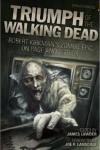Triumph of The Walking Dead
James Lowder, Editor
Smart Pop
Trade Paper, 256 pages, $14.95
Review by Sheila M. Merritt
Triumph of the The Walking Dead surprises. Certainly, a collection of 15 essays examining “Robert Kirkman’s Zombie Epic on Page and Screen” could have been tediously narrow in focus. And the subject matter might have lead to dry academic analysis or a camp, over-the-top, tone. Happily, editor James Lowder has gathered an array of writers whose styles and backgrounds are varied. There is much insight, social comment, history, and humor. One does not have to be a devotee of either the comic book or the television series to enjoy this compilation of reflections on the enormous popularity of Kirkman’s contribution to the subgenre.
It is safe to say that part of the appeal has to do with having multi-dimensional characters. In “Pathos of the Walking Dead” Kyle William Bishop discusses the TV adaptation; expressing the accessibility of the non-zombies: “Although the zombies obviously function as catalysts for the show’s physical actions and apocalyptic story line, the core of The Walking Dead addresses the essential concerns of dramatic pathos: the struggles, losses, and emotional traumas experienced by the human protagonists.”
The lead human protagonist, Rick Grimes, is emotionally reactive; yet remains admirably capable of functioning in crisis. As Jonathan Maberry expounds in “Take Me to Your Leader,” Grimes is a figure who adjusts to tribulations: “The series is not, in fact, about heroes at all. It’s about someone discovering within himself a sense of purpose that is every bit as infectious as the disease that made the dead rise.”
For all the positive reactions to focusing on characterization, there are invariably opposing views. Racial and gender stereotyping get called out by websites and chat rooms. Often, the criticism is derived from the impression that the inclusion of a racist or sexually abusive character can be perceived as shorthand for “villain.” In her exposition entitled “No Clean Slate” Kay Steiger looks at the validity behind the uproar; offering examples with which, at times, she concurs. In summation, however, she comes to this controversial conclusion: “For all the objections to the depictions of race and gender in The Walking Dead, these critics, to some degree, are missing the point. Racism and sexism exhibit themselves every day in a world without a zombie apocalypse; we shouldn’t expect these problems to disappear when humans are fighting for their very survival.”
In much less contentious discussions, Jay Bonansinga and Vince A. Liaguno regard the eloquent translation and smooth transmission, of the comic book storyline to novelization and television. In “A Novelist and a Zombie Walk Into a Bar” Bonansinga focuses on adapting Kirkman’s universe into a series of novels: “The way the visual flow of the comic is organized cries out for analogous organization in a book. The cliffhanger splash pages suggest twist endings to chapters. The density of panoramic landscapes leads to cinematic scene-setting. The gruesome detail of cadaverous faces and all the vivid carnage demands visceral description.”
Liaguno’s offering, “Happy (En)Trails” offers a distillation on the various levels of cable television rules of censoring: “Basic cable, the weird no-man’s land between network TV and subscription entertainment, blurs that hard divide between the safety of policed network fare and the edginess of less restrictive pay-cable outlets. The Walking Dead takes full advantage of this distortion and switches the game up a bit.”
This is just a sampling of the engaging essays included in Triumph of The Walking Dead. The book is a most refreshing read that probes the appeal and acclaim of the comic book, while taking a penetrating look at the success of the TV show which amplified upon it: a television transfer that upholds the standards and expectations for legions of established enthusiasts, and continues to garner new fans in the process.










I bet the book is good, but I also bet there’s no mention of how AMC screwed over Frank Darabont during the making of the second season for television.
That happened after the book was written, didn’t it? But as it’s not a licensed product associated with AMC but a critical collection, surely that would have been fair game to discuss if they could have.